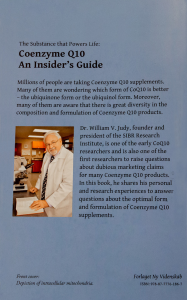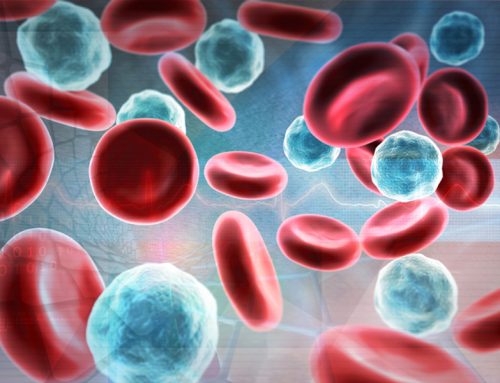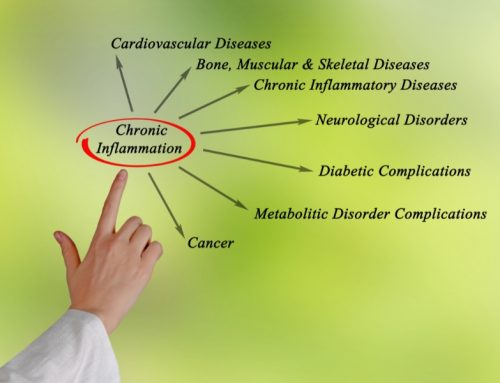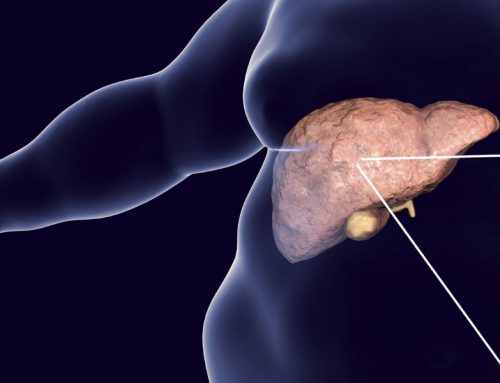
Professor Urban Alehagen, Linköping University, has reported that daily supplementation with Coenzyme Q10 and high selenium yeast significantly reduces the blood concentrations of known bio-markers for systemic inflammation. This anti-inflammatory effect may be one of the mechanisms by which Coenzyme Q10 supplementation protects the cardiovascular system.
Coenzyme Q10 supplementation with 100 – 300 milligrams daily promotes good heart health [Alehagen, Mortensen]. Supplementation is important because most of the body’s supply of Coenzyme Q10 comes from endogenous bio-synthesis, not from the diet, and, as we get older, our bodies produce less Coenzyme Q10 [Kalén].
The primary functions of Coenzyme Q10 are bio-energetic and antioxidant. Coenzyme Q10 is an essential co-factor in the cellular production of ATP energy. It is also an important fat-soluble antioxidant protecting the cells against oxidative damage caused by harmful free radicals [Littarru].
Coenzyme Q10 also improves endothelial function, the functioning of the layer of cells on the inside of the arteries and veins, the heart, and lymph vessels [Belardinelli]. The endothelium regulates the dilation and constriction of the blood vessels and limits the risk of thrombosis and inflammation.
More recently, researchers have become aware that Coenzyme Q10 has a significant anti-inflammatory effect [Alehagen; Fan; Zhai].
Coenzyme Q10 and Chronic Low-Grade Inflammation
Inflammation can be an acute or a chronic immune system response. Chronic inflammation can contribute to the development and progression of metabolic disorders and degenerative diseases [Zhai].
Typically, researchers evaluate the effect of Coenzyme Q10 supplementation on chronic low-grade inflammation by comparing the effect of the active CoQ10 treatment with the effect of a placebo treatment on the blood levels of known bio-markers for inflammation.
Professor Urban Alehagen’s KiSel-10 Study Results
The KiSel-10 study was a prospective randomized, double-blind, placebo-controlled study of the effect of combined Coenzyme Q10 and high-selenium yeast supplementation, compared with matching placebos, on heart disease mortality, heart function, and health-related quality of life in senior citizens still able to live at home [Alehagen 2013].
As part of the study, Professor Alehagen and his team of researchers measure the relative effect of the combination treatment (Coenzyme Q10 and high-selenium yeast) and the placebo treatment on bio-markers for inflammation.
First, Professor Alehagen reported that the Coenzyme Q10 + high-selenium yeast treatment significantly reduced the blood levels of C-reactive protein, a known bio-marker for inflammation. In the placebo group, the blood levels of the C-reactive protein bio-marker actually increased during the course of the study [Alehagen 2015].
Then, Professor Alehagen reported that the combined Coenzyme Q10 + high-selenium yeast treatment was associated with significant reductions in the blood concentrations of the following bio-markers for inflammation:
- osteopontin
- osteoprotegerin
- sTNF receptor 1
- sTNF receptor 2
The positive effect of the Coenzyme Q10 + high-selenium yeast supplementation on chronic low-grade inflammation may be one of the mechanisms by which Coenzyme Q10 supplementation improves heart function and reduces the risk of death from heart disease [Alehagen 2019].

A good read is the 2019 book — Coenzyme Q10: An Insider’s Guide — by long-time Coenzyme Q10 researcher, Dr. William V. Judy. The book is available from amazon.com.
Meta-Analyses of CoQ10 Supplementation and Inflammation
Fan 2017
A meta-analysis of 17 randomized controlled trials of CoQ10 supplementation enrolling 811 study participants revealed that the CoQ10 supplementation is associated with significantly reduced concentrations of the following bio-markers in the blood circulation:
- C-reactive protein
- Interleukin 6
- Tumor necrosis factor alpha
Zhai 2017
A meta-analysis of nine studies enrolling 428 persons diagnosed with a metabolic disorder showed that Coenzyme Q10 supplementation significantly reduced blood concentrations of tumor necrosis factor alpha but did not significantly reduce the circulating levels of C-reactive protein and Interleukin 6 as compared with placebo.
Clinical Studies of CoQ10 Supplementation and Inflammation
Rahmani 2018: Patients with Polycystic Ovary Syndrome
Coenzyme Q10 supplementation – 100 milligrams daily for 12 weeks – resulted in significantly reduced levels of tumor necrosis factor alpha in patients with polycystic ovary syndrome.
Heidari 2018: Patients with Diabetic Nephropathy
Coenzyme Q10 supplementation – 100 milligrams daily for 12 weeks – resulted in significantly reduced levels of tumor necrosis factor-alpha in patients with diabetic nephropathy.
Liu 2016: Hepatocellular Carcinoma Patients
Coenzyme Q10 supplementation – 300 milligrams daily for 12 weeks – resulted in significantly decreased blood levels of c-reactive protein and interleukin 6 in hepatocellular carcinoma patients following surgery.
Farsi 2016: Non-Alcoholic Fatty Liver Disease Patients
Coenzyme Q10 supplementation – 100 milligrams daily for 12 weeks – resulted in significantly decreased blood levels of c-reactive protein and tumor necrosis factor alpha in non-alcoholic fatty liver disease patients.
Abdollahzad 2015: Rheumatoid Arthritis Patients
Coenzyme Q10 supplementation – 100 milligrams daily for two months – resulted in significant suppression of the over-expression of tumor necrosis factor alpha bio-marker in rheumatoid arthritis patients.
Sanoobar 2015: Multiple Sclerosis Patients
Coenzyme Q10 supplementation – 500 milligrams daily for 12 weeks – resulted in significantly decreased levels of the circulating inflammatory bio-markers tumor necrosis factor alpha and interleukin 6 in multiple sclerosis patients.
Bagheri Nesami 2015: Mildly Hypertensive Patients
Coenzyme Q10 supplementation – 100 milligrams daily for 12 weeks – significantly reduced the circulating levels of the inflammatory bio-markers C-reactive protein and interleukin 6 in mildly hypertensive patients.
Akbari Fakhrabadi 2014: Type-2 Diabetes Patients
Coenzyme Q10 supplementation – 200 milligrams daily for 12 weeks – resulted in significantly reduced blood concentrations of the bio-marker C-reactive protein in patients with type-2 diabetes.
Lee 2013: Coronary Artery Disease Patients
Coenzyme Q10 supplementation – 300 milligrams daily for 12 weeks – resulted in significantly decreased blood levels of tumor necrosis factor alpha in patients with coronary artery disease.
Conclusion: Coenzyme Q10 has an Anti-Inflammatory Effect
Remember:
- Taking Coenzyme Q10 supplements together with a meal containing some fat gives a better absorption of the Coenzyme Q10.
- Dividing the CoQ10 dosage gives better absorption. 2 x 100 milligrams gives greater absorption than 1 x 200 milligrams.
- Not all Coenzyme Q10 supplements are equally absorbable and effective. A well-documented Coenzyme Q10 supplement should give better bio-availability and greater health benefits.
Sources
Abdollahzad, H., Aghdashi, M. A., Asghari Jafarabadi, M., & Alipour, B. (2015). Effects of Coenzyme Q10 Supplementation on Inflammatory Cytokines (TNF-α, IL-6) and Oxidative Stress in Rheumatoid Arthritis Patients: A Randomized Controlled Trial. Archives Of Medical Research, 46(7), 527–533.
Akbari Fakhrabadi, M., Zeinali Ghotrom, A., Mozaffari-Khosravi, H., Hadi Nodoushan, H., & Nadjarzadeh, A. (2014). Effect of Coenzyme Q10 on Oxidative Stress, Glycemic Control and Inflammation in Diabetic Neuropathy: A Double Blind Randomized Clinical Trial. International Journal for Vitamin and Nutrition Research, 84(5–6), 252–260.
Alehagen, U., Johansson, P., Björnstedt, M., Rosén, A., & Dahlström, U. (2013). Cardiovascular mortality and N-terminal-proBNP reduced after combined selenium and Coenzyme Q10 supplementation: a 5-year prospective randomized double-blind placebo-controlled trial among elderly Swedish citizens. International Journal of Cardiology, 167(5), 1860-1866.
Alehagen, U., Lindahl, T. L., Aaseth, J., Svensson, E., & Johansson, P. (2015). Levels of sP-selectin and hs-CRP Decrease with Dietary Intervention with Selenium and Coenzyme Q10 Combined: A Secondary Analysis of a Randomized Clinical Trial. Plos One, 10(9), e0137680.
Alehagen, U., Alexander, J., Aaseth, J. & Larsson, A. (2019). Decrease in inflammatory biomarker concentration by intervention with selenium and Coenzyme Q10: a sub-analysis of osteopontin, osteoprotergerin, TNFr1, TNFr2, and TWEAK. Journal of Inflammation, 16,5,1-9.
Bagheri Nesami, N., Mozaffari-Khosravi, H., Najarzadeh, A., & Salehifar, E. (2015). The Effect of Coenzyme Q10 Supplementation on Pro-Inflammatory Factors and Adiponectin in Mildly Hypertensive Patients: A Randomized, Double-Blind, Placebo-Controlled Trial. International Journal for Vitamin And Nutrition Research, 85(3–4), 156–164.
Belardinelli, R., Mucaj, A., Lacalaprice, F., Solenghi, M., Tiano, L. & Littarru, G-P. (2006). Coenzyme Q10 and exercise training in chronic heart failure. Eur Heart J, 27(22): 2675-81.
Fan, L., Feng, Y., Chen, G.-C., Qin, L.-Q., Fu, C.-L., & Chen, L.-H. (2017). Effects of coenzyme Q10 supplementation on inflammatory markers: A systematic review and meta-analysis of randomized controlled trials. Pharmacological Research, 119, 128–136.
Farsi, F., Mohammadshahi, M., Alavinejad, P., Rezazadeh, A., Zarei, M., & Engali, K. A. (2016). Functions of Coenzyme Q10 Supplementation on Liver Enzymes, Markers of Systemic Inflammation, and Adipokines in Patients Affected by Nonalcoholic Fatty Liver Disease: A Double-Blind, Placebo-Controlled, Randomized Clinical Trial. Journal of The American College Of Nutrition, 35(4), 346–353.
Heidari, A., Hamidi, G., Soleimani, A., Aghadavod, E., & Asemi, Z. (2018). Effects of Coenzyme Q10 Supplementation on Gene Expressions Related to Insulin, Lipid, and Inflammation Pathways in Patients with Diabetic Nephropathy. Iranian Journal of Kidney Diseases, 12(1), 14–21.
Kalén, A., Appelkvist E.L., Dallner G. (1989). Age-related changes in the lipid compositions of rat and human tissues. Lipids, 24(7):579–584.
Littarru, G-P & Tiano, L. (2010). Clinical aspects of coenzyme Q10: an update. Nutrition, 26(3):250-4.
Mortensen, S. A., Rosenfeldt, F., Kumar, A., Dolliner, P., Filipiak, K. J., Pella, D., & Littarru, G. P. (2014). The effect of coenzyme Q10 on morbidity and mortality in chronic heart failure: results from Q-SYMBIO: a randomized double-blind trial. JACC. Heart Failure, 2(6), 641-649.
Rahmani, E., Jamilian, M., Samimi, M., Zarezade Mehrizi, M., Aghadavod, E., Akbari, E. & Asemi, Z. (2018). The effects of coenzyme Q10 supplementation on gene expression related to insulin, lipid and inflammation in patients with polycystic ovary syndrome. Gynecological Endocrinology, 34(3), 217–222.
Raygan, F., Rezavandi, Z., Dadkhah Tehrani, S., Farrokhian, A., & Asemi, Z. (2016). The effects of coenzyme Q10 administration on glucose homeostasis parameters, lipid profiles, biomarkers of inflammation and oxidative stress in patients with metabolic syndrome. European Journal of Nutrition, 55(8), 2357–2364.
Sanoobar, M., Eghtesadi, S., Azimi, A., Khalili, M., Khodadadi, B., Jazayeri, S., … Aryaeian, N. (2015). Coenzyme Q10 supplementation ameliorates inflammatory markers in patients with multiple sclerosis: a double blind, placebo, controlled randomized clinical trial. Nutritional Neuroscience, 18(4), 169–176.
Zhai, J., Bo, Y., Lu, Y., Liu, C., & Zhang, L. (2017). Effects of Coenzyme Q10 on Markers of Inflammation: A Systematic Review and Meta-Analysis. Plos One, 12(1), e0170172.
The information contained in this review article in not intended as medical advice and should not be used as such.








Leave A Comment